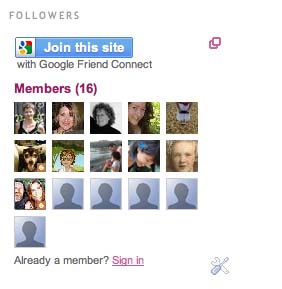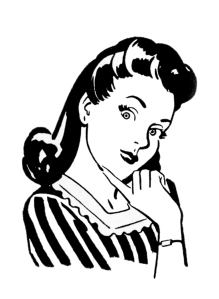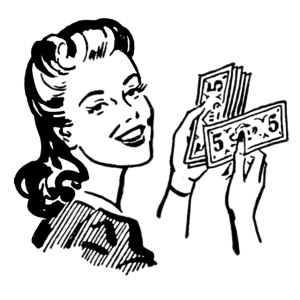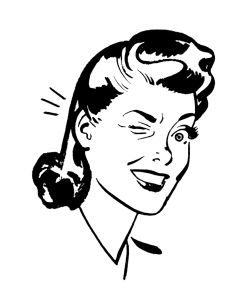I'm jumping right into the middle of the Pinterest Fray today! Part rant, part advice column and part Page Six, just for you!
The fever over Pinterest is getting hotter each and every day. Today I saw something online from an artist I know who found her beautiful creation on someones Pinterest board with no artist attribution. In fact, there was no description whatsoever. Not even a period, which I sometimes see being used. Being properly upset that her name is not attached to her hard work, this artist left the pinner a helpful lil note. I can see both sides of this, maybe because I'm a Libra or maybe just cuz I'm freaky that way. From the pinners perspective, they found an image online that they thought was beautiful and they pinned it. Perhaps they found it on Tumblr, a web site that is notorious for having millions of images of artists work with no mention of who created it or how someone could find it if they wanted to buy it. However the Pinterest user found this beautiful image, they loved it so much that they pinned it to say, "This reminds me of my style and what I love".
I'm going out on a limb here and will estimate that of all of the 4 million daily unique visitors (Each person/user/visitor counts as one visitor, even if they go on the site, log off and then come back again in the same 24 hour period) only a small percentage of users are people who can merely look at a handcrafted item and then turn around and create a knock off. And of those people, even fewer will list it for sale and make a profit off of it. For that, we can count on a couple big-box retailers who shall remain nameless, who consistently knock off artists, and provide a lower quality product, made in a country that isn't the USA, at a cheaper price.
The reality is that there are an infinite number of people who admire handcrafted items but feel like they aren't creative enough to make it themselves. These same people are more than willing to shell out more than we are charging so that they can adorn themselves with our handmade treasures. Case in point? The wife of my son's soccer coach. During my son's last soccer tournament, from a distance, it appeared that she was wearing a beautiful necklace that my friend
Sally Jean Alexander might make and I had to check it out. I asked Mrs Coach if she made it and she said she couldn't if she tried! Right away, I noticed that the quality was not the same as Sally Jean's so I asked Mrs Coach where she got it. Turns out there's a multilevel marketing company who is outsourcing the labor to make this jewelry offshore and then the party hostesses come to your home, a la Tupperware Party style, and do a home shopping party. But guess what? The coaches wife didn't know that this wasn't an original piece, handmade by one of the many talented soldering artists that I know. All she knew was that it was sparkly, she'd never seen anything like it before and she told me that frankly she would have paid twice as much to own it. She felt like she practically stole it!
The world of arts and crafts feels rather small sometimes. We see each other at art retreats, our friends on Facebook all seem to know each other and we pin each others pins on Pinterest. So, when someone knocks off another artists work, it seems like everyone is out to copy and profit from their work. I know this happens, I've seen it happen. I recently found out that a person, whom I used to work with at a major craft magazine publisher, now appears to be knocking off another artists original design jewelry, teaching classes and writing books about it. It's damn frustrating! The solution that I see is that all of us, as a community, need to confront these rip off artists and tell them to knock it off, or to well, cut it out and stop copying other peoples work. The magazines and book publishers need to stop publishing art created by people who are copy cats. Additionally, the art retreat organizers need to stop hiring teachers who take a class one week and then turn around the next and teach the exact same techniques and curriculum, using the same exact name for the class.
No human can be everywhere and know everything, so when we find out that someone is knocking off another artist, we need to let the the art retreat organizers know, because when they do, they can cancel the class of the copycat. I know this is true because it happened just a couple months ago. If we don't speak up and support each other, the copy cats will continue to rip off other peoples work and creativity and profit from it. Art retreat organizers need to put a clause in their agreements with teachers that the material they are teaching is their original technique and that they will be publicly humiliated if it's found that they misrepresented themselves. Or, something like that.
But to get back to Pinterest, and the hurdles that it presents for artists and their intellectual property, I think that we can politely police ourselves. My policy is that if I'm pinning an image I found online, I'm responsible for adding in the name of the artist to the description or the name of the blog where I found the image (that way they're responsible, no?) if the blogger didn't say whose work it was. One would think that artists would be the first people to give credit where credit is due, but it's not happening. A very well known craft artist has pins all over her board that don't have any credit to the original artist. (She also isn't writing blogs lamenting the issue so I'll cut her a break). If I find an image that's already been pinned on Pinterest that I like, I repin it and if I'm not in a huge hurry I'll write that "if someone knows who made this, let me know and I'll happily give them credit". If we find that someone has pinned our original work without giving us credit, we can nicely let them know that we made it and thank them ever so much for admiring our work. We just gained a fan, an ambassador and a brand evangelist for life by making a personal connection with that person who loves our style and we can thank them for helping spread our work and our brand. Chances are, if a person is pinning your work, they're not planning on copying it and passing it off as their own. Or maybe they are, and I'll be writing about them in a future column.
Moving forward, protect your work by protecting your images. On Flickr, there is a way to prevent people from pinning your images by going into "Privacy and Permissions", "Global Settings", "Allow others to share your stuff". Edit these settings and Flickr won't allow users to share your work so that you have control of your images.
Whenever you need to use one of your images online, apply a watermark in a place where it can't be cropped out without hacking out part of the product. The key to using Pinterest to your advantage is in knowing how it works. The default description for each pin is the image file name. So, each time you save an image to be used online, make sure that your name or the name of your company is in the filename. That way your info will be auto-populating the description when someone comes along and wants to pin your product onto their board.
Facebook is a beast that can't easily be tamed when it comes to protecting your images. Anyone can look at your image on Facebook, copy it to their computer and use it in any way they want. Watermarking is the only way to protect your images that you'll be uploading to Facebook.
Pinterest is here to stay and we have to stay ahead of it. Knowledge is power and I'm going to share what I learn about using Pinterest with you. Pinterest is an incredible tool for your business and understanding the upsides and downsides is the key to using it effectively. I know I'm jumping into an ocean full of swirling waters and
ferocious nibbling sharks with this, but let me know what you think in the comments. I'll put on my big girl pants and deal with it! :)











































